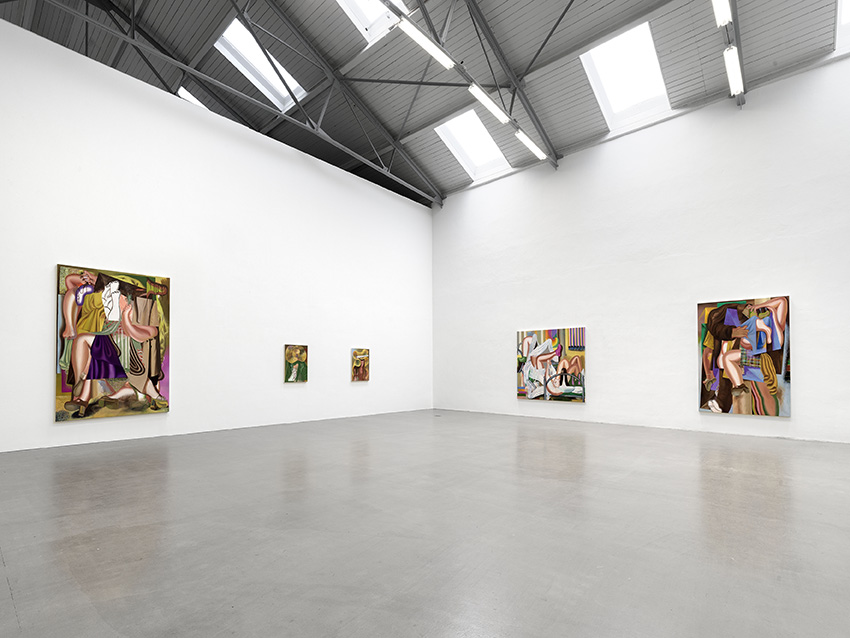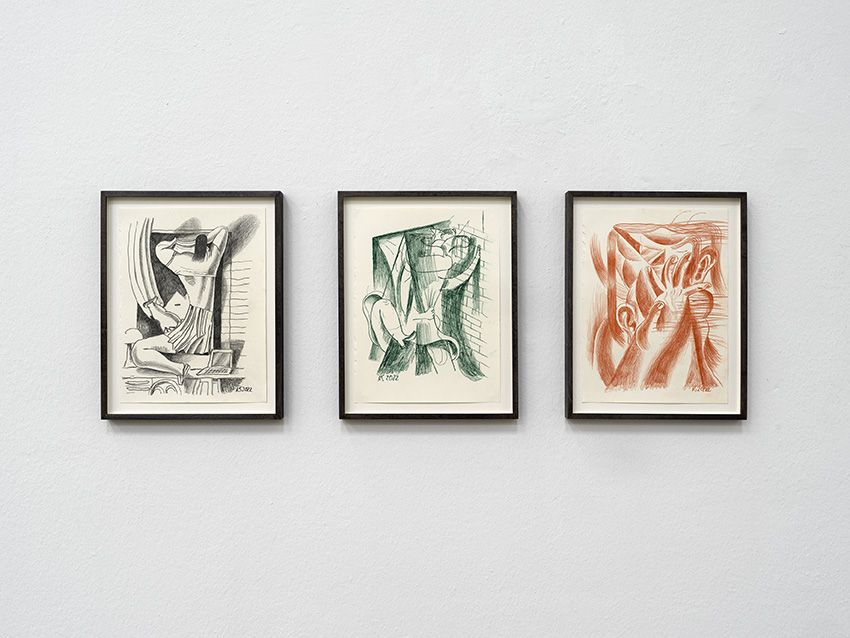Kristina Schuldt
BEBEN
Galerie EIGEN + ART Leipzig
April 30 - June 4, 2022
Film & Edit: TABLEAU Films (Matthias Maercks)
Kristina Schuldt
BEBEN
Galerie EIGEN + ART Leipzig
April 30 - June 4, 2022

Nothing has to fit
- Excerpt from an Interview by Saša Bogojev
Rough and elegant, beautiful and grotesque, strong and fragile, vibrant and dispiriting, successful and failed. Such are the perpetual interplays that play with equilibrium in what we recognize as life. For Kristina Schuldt, they function as elements of a language through which she examines and seeks to explain about disorder, randomness, and uncertainty of everyday experiences. Her sturdy muses clutch withering flowers or valiantly navigate in high heels, pure metaphors for personal experiences, coded visuals that represent the human condition.
Do you have a certain formula that you use when you approach a blank canvas?
No. It’s when I start, I just know that anything I put down, will not last. And it’s really, really frustrating. But there’s a point where it becomes like a haptic thing. It gets a body.
I also do have a new trick. I’m showing you these colors, these jars of old tubes of paint from my grandfather from Russia. I always choose one color and put a little bit in the painting. I have this idea that the soul of my grandfather will be there and will help me to find this picture.
Oh, I really like that.
I don’t know if that’s just in my mind. But then I also need to choose the color, and that is also really difficult and takes a long time. For example, this painting, which appears to be far from complete, for me, looks like shit. I have to change everything.
Does your grandad’s work still exist somewhere?
He was a painter and sculptor. He died when I was one year old, and I only have these old photos and some of his things, and I really like them. He was working in a social realism manner.
I always sensed that element in your work too, though it seems to take a few steps towards cubism or even abstraction. What appeals to you about that?
I always have the problem that I cannot decide. When I finish a body of work, then I am thinking about being more realistic or more abstract. I cannot decide, so I do both. I try to do both. Also, I think I’m connected to everything. I don’t want to set any borders on myself. I think today you can do everything. You can exercise or use everything. So, with the Internet, you can find and use everything.
Does that get frustrating?
Yes. But I think that it’s normal, because it’s hard to have an idea about new things. It’s always a combination of things that already exist. Yes, it’s a problem and I would be really happy if anyone finds something new or invents something new, but until this happens, we all have to just do what we’re doing. For example, my work is always compared with Fernand Léger, and yes, I have phases when I’m really into something. This year, I admired an Austrian painter, Waldmüller. I bought this book and it’s a little bit kitsch, but I was really into it.
I don’t force it at all, but it just happens that I realize after some time that there’s something from it
that seeps into my own painting.
I saw Léger and Tubism being referenced, but you’re going in a pretty unexpected path with your colors. They’re not flashy colors in any sense, so how do you choose them?
It’s a really long process. I keep changing the colors and looking at how it works. When I work, I have this feeling that it’s all really boring and there are no new colors. I need more. Even when I’m buying colors, it’s like, “Well, that’s so boring.” So, I always try to make a new combination so the colors look different.
It must be pretty difficult to start with nothing and go towards the finished piece and all those color combinations. Do you impose restrictions or certain methods to achieve the goal?
One restriction is when the painting is out of the studio, nothing will happen. It’s really dangerous to let the painting stay here. I have this one motto, but I keep forgetting about it! So when I remember, then I have fun again. It is—“nothing has to fit.” It’s really fun because most of the time I’m only thinking, “I’m a loser. I cannot finish at this stage. I’m really weak. I can do nothing. Everyone is successful and everyone can paint.” And then I remember this motto and then I start having fun again.
That’s pretty awesome! So would you say you work better under pressure?
Yes. I work better when I have deadlines. But then everyone gets crazy around me, my family, and everyone. Everyone becomes an enemy. While I’m working, I’m a real monster.
So the collage elements evolve from “nothing has to fit”?
This also came from the working process. I just tried it and then I thought it’s really nice. So, I can use this, and normally these things are laying around everywhere and they’re also dirty and with some other colors on them. But for me, they’re really sacred. So when I paint them in the picture, I get to keep them.
And when you said that it comes from the working process, what does that phase look like?
It’s mostly about trying things out. Sometimes when I have a hand that is painted on a sheet of paper, it should not be a real hand. It’s only a hint that there could be a hand. Or maybe a head that’s not a real head, only trying to be.
Yeah, the images do feel fragmented. How do you approach that?
I think sometimes I wish that the painting would be like a film, like a movie. When you make it fragmented, it gives a little bit the feeling that it’s moving, that you’re watching something from different perspectives. Also, when you remember something, I think it’s also fragmented. This is what it’s about in oil paintings, always thinking of something and then finding a picture to save it, and to make it a universal thing that everyone can understand.
Is it easier for you to communicate in that painterly language rather than an interview like this?
When I talk to you, sometimes I have the feeling, but I have a blackout and I have no idea how to express it, no answer. But in painting, it feels like it’s my language. Everything is familiar. They’re my props here and I know them.
So, you’re not a big fan of talking about your work?
No.
